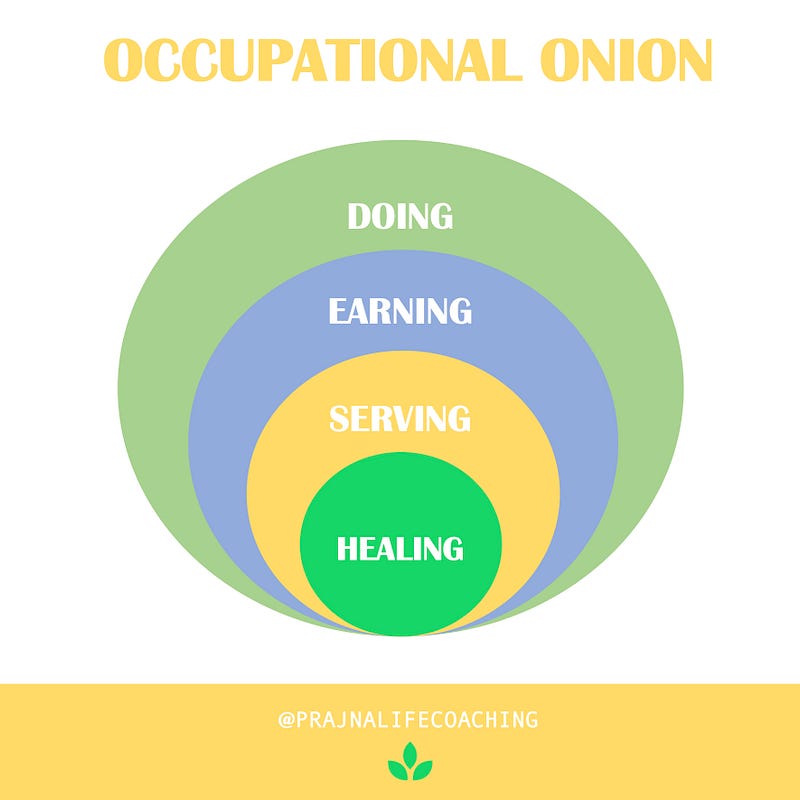A Comprehensive Perspective on Work: The Occupational Onion
Written on
Chapter 1: Understanding Work
Work is often perceived in various ways: for some, it’s merely a means to earn money, while others consider it a vocation or a chance to serve. In this section, I present a model known as the "Occupation Onion," which aims to provide a comprehensive view of work, encouraging individuals to derive greater meaning from their professional lives.

As a child, I dreaded the question, “What do you want to be when you grow up?” It always stumped me, leading to a sense of confusion. I found myself pondering, “I’m already here; what else is there to become?”
This question reveals a significant aspect of our societal mindset. It often equates a person's identity with their job, emphasizing the “doing” aspect of work. For instance, if you code, you’re labeled a programmer; if you teach, you’re a teacher. However, there is much more beneath the surface. The "doing" layer of work is merely the outermost shell; the essence of meaningful work lies deeper.
In my experiences, focusing solely on “what I do” has frequently diminished my job satisfaction. Work can often become a monotonous cycle of tasks, leading to burnout. The Occupation Onion model aims to unveil the often-overlooked dimensions of work that can enrich our professional experiences.
Section 1.1: The Doing Layer
In American culture, we heavily emphasize the “doing” aspect of work. The inquiry, “What do you want to do for a living?” is a common one. As we age, this question morphs into, “What do you do?” highlighting the importance placed on job titles.
Interestingly, some individuals derive significant meaning from this layer. For example, I once conversed with a graduate student who was passionate about aviation. His desire was to work in the aerospace field, showcasing how personal affinities can lead to fulfilling careers.
However, not everyone possesses such clear interests. Many of us feel societal pressure to define ourselves through our professions, leading to years of searching for a passion that may never materialize. In my case, I’ve learned to recognize that my path may lie in the more profound layers of the onion.
Layer 2: The Earning Layer
The second layer of the onion focuses on the rewards we gain from work, primarily financial compensation. While not all jobs yield monetary benefits, our economic systems increasingly necessitate financial gain. This pressure can overshadow meaningful work, yet financial resources also allow us to live more comfortably.
In American society, there’s often a stigma associated with wealth, linking it to greed. However, it’s essential to recognize that wealth can also foster positive change for oneself and one’s community. Achieving financial stability can lead to a more fulfilling life.
This layer presents a contradiction: while society often views a focus on wealth negatively, a lack of financial resources can lead to hardship. Understanding this connection may help us navigate our motivations and aspirations regarding earnings.
Layer 3: The Serving Layer
Every profession fundamentally involves serving others, although this may not always be apparent. Service-oriented roles clearly illustrate this point, yet even jobs that seem distant from direct service, such as research, contribute to the greater good.
For instance, one of my clients felt a strong desire to serve her Hispanic community, highlighting how personal connections can drive our service motivations. Understanding who we serve can infuse our work with greater significance.
In individualistic societies, recognizing our role in serving others can be challenging. It often requires rethinking how our skills can positively impact those around us, which may take time and effort.
Layer 4: The Healing Layer
The healing aspect of work is arguably the most critical. Unfortunately, this layer is often overlooked or dismissed as too spiritual or abstract. However, focusing on healing is vital for addressing contemporary issues such as climate change and social disconnection.
Healing can manifest in various ways, particularly through compassion in our interactions. For example, a therapist who approaches their role with empathy can facilitate healing for both themselves and their clients.
Even in technical fields like engineering, incorporating a healing mindset can enhance outcomes. When engineers engage with the end-users of their products, they create solutions that genuinely serve people's needs.
Conclusion: The Broader View of Work
Work encompasses a spectrum of emotions and experiences. Our modern culture frequently narrows this perspective to focus on the “doing” and “earning” aspects. The Occupational Onion model presents a more expansive understanding of work, emphasizing the layers of doing, earning, serving, and healing.
By choosing to explore these deeper layers, we can cultivate lasting meaning and joy in our professional endeavors.
The first video title is "Land The Perfect Job By Having Your Rich Dad Set You Up (Brought To You By Cottonelle)." This engaging video outlines strategies for securing the ideal job through networking and leveraging connections.
The second video title is "High Unemployment Rate Linked To One Man With 42,000 Jobs." This thought-provoking video delves into the correlation between an individual's job opportunities and broader economic trends.